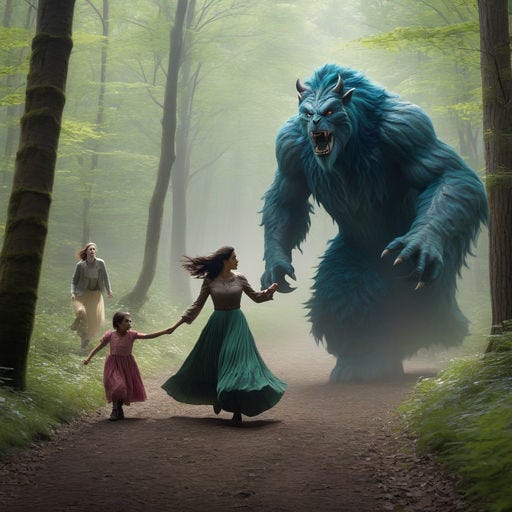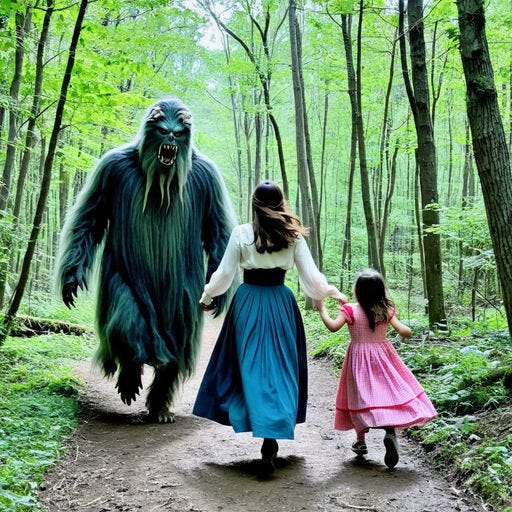What is ‘a monster’? When you criticise someone, or offer them choices, or look back at history, and the word ‘monster’ appears in the discourse… what does it mean?
Well, in the realm of political and religious discourse it usually means someone who has taken an action that puts them outside of the realm of traditional human morality. Stalin (since everyone uses Hitler as their example), who murdered millions of Ukrainians can be called, in political discourse, a ‘monster’.
However it can also be used in relation to beliefs. Someone who sees nothing wrong with torture can, in certain circles, be called ‘a monster’. Even if they haven’t actually tortured anyone, their mere acceptance of the idea can be seen as monstrous.
Introduction
My post ‘The Great Gulf’ spurred a reader to write a response, “An Uncommon Argument Against Abortion”. In it Melissa Petrie deals with the ‘human connection’ aspect of the child-murder debate. She points out that one thing that is often missing in the debate is the concept of connection between human beings.
Along the way she says this:
Now, imagine you look into it, and one ‘side’ of the debate talks about you as if you are a monster, while the other shows you empathy.
And it triggered me (joke intended) to write this post. Because I think she is very correct… but I think that I might have a different perspective on who the monster is. I heavily recommend reading her post, and the comments under it, before reading on here.
[Note: After I wrote (but before I published) this post the original author repudiated the wording she used here. As she says it is the view that many have, and that she grew up with, I will continue to use the quote. I do wish to make it clear that it does not represent her current view.]
Pre-Fall
I have a post “From the Beginning’, where I deal with the argument from an ‘Egalitarian’ (read anti-Christian feminist) where she claimed (or so I read it) that none of the hierarchy mentioned in Scripture between men and women existed ‘pre-fall’. She saw it all as being an unfortunate result of the fall that we should be working against.
One of the things I had to do in that post was to define ‘the fall’. When was it that man ‘fell’? At what part in the creation story? In my reaction to this post I think we have to do the same thing in order to judge ‘monster’ness. What woman are we talking about? Are we talking about a woman before she has her child murdered, or after? Cause it makes a difference.
Pro-Life
Now, I am an abolitionist, not a ‘pro-lifer’, but I think that most people have the ‘pro-life’ community in mind when they think of this debate, so I’ll use that term. When the ‘pro-lifer’ looks at a woman considering murdering her child, what do they see? Who do they see?
Because before the child has been killed the ‘pro-lifer’ sees… a mother. A mother with a child inside her. They plead with her as a mother. They wish to get her in for an ultrasound why? Because they think that if the mother can actually see her child, she will be emotionally moved to protect the child.
They see the mother with her four year old child, fourteen year old child, and forty year old child. They see the mother (and father) and the child living and growing together.
Pro-Choice
Now what about the ‘pro-choicer’? What do they see?
They see a woman not strong enough to be a mother. Not educated enough, or too busy. They see woman whose life will be ruined if she is punished with a child.
Pro-Infanticide
This series started with a note that stated that we all, pro-life and pro-choice, understand that ‘abortion’ is actually infanticide. That it is a living human being, and that ‘abortion’ kills it. And concludes ‘so what?’.
Back to the Monster
My question would be… which of these treats the mother as a monster? The pro-lifer, who sees her as contemplating murder but attempts to call her away from it? The pro-choicer, who sees her as too weak be a successful mother? Or the pro-infanticide camp, who asks her to say ‘so what’ to the idea of killing her own child?
Post-Fall
Now let us ask the same question… after the child has been murdered.
I believe that one reason that we use the word ‘monster’ is because, in our eyes, monsters have no moral capabilities. We refuse to believe that a human being, an actual human being, could have made such destructive choices… murdered so many people, been so cold hearted.
And so when a pro-lifer (which doesn’t happen often) or abolitionist says that abortion involves the murder of a human being, the implication is clear: you are a murderer. You can only be a murderer, especially of a such a defenceless human being, especially of such a defenceless human being that is your own daughter… if you are devoid of humanity. You are a monster.
Unfortunately this reasoning is false. Human history has been filled with examples of all sorts of brutality and murder… and they were humans, not monsters. They were humans, with moral reasoning and moral culpability.
But now lets look at the other side. Because they, I would argue, are the ones who are actually calling mothers monsters. The pro-choicers, who see mothers as weak individuals, too weak to live with the consequences of their own actions. Or the pro-infanticiders, who call the mother to abandon human morality altogether.
(Images from Playground. Which didn’t always totally understand the concept of running *away*.)
Conclusion
And even as they did not like to retain God in their knowledge, God gave them over to a reprobate mind, to do those things which are not convenient;
Being filled with all unrighteousness,
fornication, wickedness, covetousness, maliciousness; full of envy, murder, debate, deceit, malignity; whisperers, Backbiters, haters of God, despiteful, proud, boasters, inventors of evil things, disobedient to parents, Without understanding, covenantbreakers,
without natural affection,
implacable, unmerciful:
Who knowing the judgment of God, that they which commit such things are worthy of death, not only do the same, but have pleasure in them that do them.
Romans 1:28-32
There is a Greek word for ‘love’ 1that is only used in the Scriptures in its negative sense. The love concerned is ‘natural affection’, and is used for the kind of instinctive love that animal mothers have for their young. And Paul, when he speaks of a society spiralling down into depravity, uses this form of love… in the negative. In a large list of sins that the society will be known for, he speaks of them being ‘without natural affection’.
If there is a society that can be called ‘monstrous’, it is a society that lacks even ‘natural affection’. And one side in the ‘abortion’ debate is literally calling for that society. They are doing so under the guise of ‘empathy’ and ‘understanding’. But it is treachery, not empathy, if you call a mother to murder her own child.
Thank you for reading Von’s Substack. I would love it if you commented! I love hearing from readers, especially critical comments. I would love to start more letter exchanges, so if there’s a subject you’re interested in, get writing and tag me!
Being ‘restacked’ and mentioned in ‘notes’ is very important for lesser-known stacks so… feel free! I’m semi-retired and write as a ministry (and for fun) so you don’t need to feel guilty you aren’t paying for anything, but if you enjoy my writing (even if you dramatically disagree with it), then restack, please! Or mention me in one of your own posts.
If I don’t write you back it is almost certain that I didn’t see it, so please feel free to comment and link to your post. Or if you just think I would be interested in your post!
If you get lost, check out my ‘Table of Contents’ which I try to keep up to date.
Thanks again, God Bless, Soli Deo gloria,
Von
Links
A Great Gulf
There is a wide gulf between the Christian and the pagan. Oftentimes a far wider gulf than we think. A wide gulf between the culture of ‘made in the image of God’ and ‘‘free-floating purposeless atoms”. Thus when one Christians says something to another Christian, about a Christian issue, or one in at least a culturally Christian context, the pagan can …
στέργω stergō










Good to see someone speaking so clearly about this stuff. I'm still not quite sure I paid enough attention to detail to find the difference here between pro-life and abolition, but in any case, it should be no surprise that those who dehumanize the baby also dehumanize the mother.
Well done. When I started reading, I was ready to defend the position that no one in this discussion is a monster, but now, you've given me reason to pause and think.
Your definition of the word 'monster' is absolutely spot-on—it refers to someone who deviates from normal, acceptable human behavior so strongly that it shocks the conscience.
I like that you maintain that the mother who chooses to have an abortion is NOT a 'monster' (only a human who has done something immoral)—the monster is the person who acts as though infanticide doesn't matter at all, and convinces others to believe the same.
It kind of becomes a semantics game at this point, because the word 'monster' implies evil intentions, and I don't think most people who minimize the consequences of abortion really understand what they are doing. You mention this yourself—this is done under the guise of empathy. Can someone who truly believes themselves to be acting with empathy really be a monster?
In other words, I think the word is unfairly harsh (ironic, as I'm the one who first used it in my post).
However, if we conceptualize 'monster' simply as a deviation from human morality, then the assertion holds up. Murdering our own children is counter to our true nature.
I can think of a counter-argument: that 'monsters' are people who do what they do even when the whole of society is outraged by their actions. The 'pro-infanticide' camp does not have this negative stigma to hint that there might be something wrong (and if they did, they would probably adjust their position, as the spread of this idea is largely due to liberal virtue signaling).
Once again, we're left with semantics (and more moral absolutism/relativism stuff). If a 'monster' is someone who acts against their true nature as defined by a universal moral code, then 'pro-infanticiders' are monsters. If a 'monster' is someone who acts against socially-defined morality, then they are not.
Thanks for writing this; I really enjoyed reading it and working through the argument. Let me know what you think!